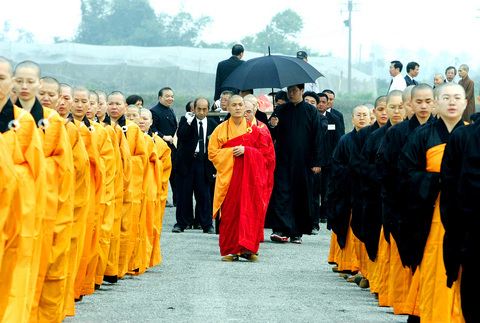Koo Cheng-fu (辜振甫), the former Straits Exchange Foundation (SEF) chairman who died in early January, was laid to rest in a cemetery on a scenic farm in Kaohsiung County yesterday.
Koo -- who held a historic ice-breaking meeting with Beijing's chief negotiator with Taiwan, Wang Daohan (
Koo's coffin was moved on Tuesday from Taipei to the Fukuangshan Monastery, where Buddhist master Hsing Yun (

PHOTO: CNA
In his memorial prayer, Reverend Hsing Yun lauded Koo as having lit up the world and done everything in his power to benefit the people.
Koo, a business tycoon who also had a talent for writing poetry and singing Peking opera, was appointed chairman of the foundation in March 1991
Although Koo's family had tried to keep the burial ceremony low-profile, the funeral procession totaled about 100 vehicles, including several tourist buses.
According to the family, a memorial museum similar to the Koo Museum located in Lukang, Changhua County will be built next to the cemetery where Koo is buried.
The farm on which the cemetery is located was reportedly part of a 3,000-hectare tract that Koo's father, Koo Hsien-jung (
According to the family, Koo was still worrying about the tension between Taiwan and China even in his final days.
Koo visited China in October 1998 and met with then Chinese President Jiang Zemin (
Koo also served as head of the Chinese National Federation of Industries and of the Chinese National Association of Industry & Commerce, contributing greatly to the nation's economic development.
A senior adviser to both former president Lee Teng-hui (
Koo's passing was termed by some political observers as tantamount to the symbolic death of cross-strait relations, given that the two sides had been at a complete political impasse since July 1999 after Lee described the cross-strait relationship as "state-to-state" in nature.
Condolences for Koo's passing came not only from around Taiwan and China, but also from the US and Japan, where Koo had had prominent business and political connections.

PRAISE: Japanese visitor Takashi Kubota said the Taiwanese temple architecture images showcased in the AI Art Gallery were the most impressive displays he saw Taiwan does not have an official pavilion at the World Expo in Osaka, Japan, because of its diplomatic predicament, but the government-backed Tech World pavilion is drawing interest with its unique recreations of works by Taiwanese artists. The pavilion features an artificial intelligence (AI)-based art gallery showcasing works of famous Taiwanese artists from the Japanese colonial period using innovative technologies. Among its main simulated displays are Eastern gouache paintings by Chen Chin (陳進), Lin Yu-shan (林玉山) and Kuo Hsueh-hu (郭雪湖), who were the three young Taiwanese painters selected for the East Asian Painting exhibition in 1927. Gouache is a water-based

A magnitude 4.1 earthquake struck eastern Taiwan's Hualien County at 2:23pm today, according to the Central Weather Administration (CWA). The epicenter of the temblor was 5.4 kilometers northeast of Hualien County Hall, at a depth of 34.9 km, according to the CWA. The earthquake's intensity, which gauges the actual effect of a temblor, was the highest in Hualien County, where it measured 2 on Taiwan's 7-tier intensity scale. The quake also measured an intensity of 1 in Yilan county, Taichung, Nantou County, Changhua County and Yunlin County, the CWA said. There were no immediate reports of damage or injuries.

OFF-TARGET: More than 30,000 participants were expected to take part in the Games next month, but only 6,550 foreign and 19,400 Taiwanese athletes have registered Taipei city councilors yesterday blasted the organizers of next month’s World Masters Games over sudden timetable and venue changes, which they said have caused thousands of participants to back out of the international sporting event, among other organizational issues. They also cited visa delays and political interference by China as reasons many foreign athletes are requesting refunds for the event, to be held from May 17 to 30. Jointly organized by the Taipei and New Taipei City governments, the games have been rocked by numerous controversies since preparations began in 2020. Taipei City Councilor Lin Yen-feng (林延鳳) said yesterday that new measures by

‘WORSE THAN COMMUNISTS’: President William Lai has cracked down on his political enemies and has attempted to exterminate all opposition forces, the chairman said The legislature would motion for a presidential recall after May 20, Chinese Nationalist Party (KMT) Chairman Eric Chu (朱立倫) said yesterday at a protest themed “against green communists and dictatorship” in Taipei. Taiwan is supposed to be a peaceful homeland where people are united, but President William Lai (賴清德) has been polarizing and tearing apart society since his inauguration, Chu said. Lai must show his commitment to his job, otherwise a referendum could be initiated to recall him, he said. Democracy means the rule of the people, not the rule of the Democratic Progressive Party (DPP), but Lai has failed to fulfill his